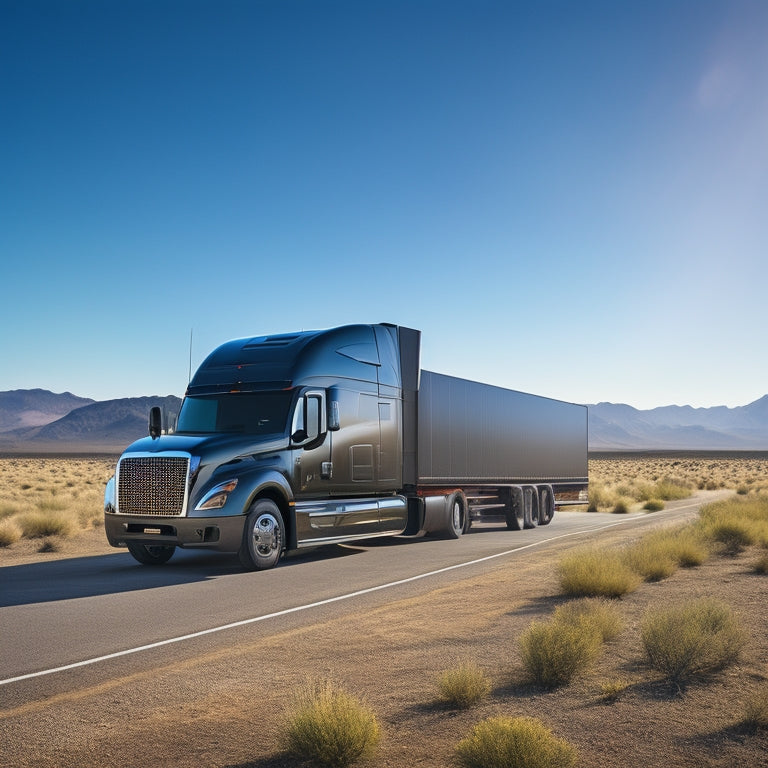
3 Best Solar Panel Systems for Commercial Trucks
Share
You're looking for the best solar panel systems for your commercial truck. Renogy, HQST, and other top brands offer high-efficiency panels with impressive warranties. Renogy's 25-year warranty and 22.5% efficiency rating make it a popular choice among truckers. HQST's 20-year warranty and 21.5% efficiency rating guarantee durability and longevity. When comparing brands, consider warranty options, efficiency ratings, and weather resistance. By prioritizing these key factors, you'll find the ideal system for your truck. Now, take a closer look at the top brands and their features to make an informed decision that meets your specific needs and expectations.
Key Takeaways
• Renogy Solar Panel System is a popular choice among truckers, offering a 25-year warranty and high-efficiency panels with up to 22.5% efficiency rating.
• HQST Solar Panel System is a well-known brand, providing a 20-year warranty and durable panels with up to 21.5% efficiency, designed to withstand harsh weather.
• When comparing brands, consider warranty options, efficiency ratings, and durability to ensure a long-lasting and efficient solar panel system for your commercial truck.
• Key features to prioritize include high-efficiency photovoltaic cells, seamless integration with the truck's electrical system, and weather-resistant components for optimal performance.
• Proper installation is crucial, requiring meticulous planning, secure roof sealing, and adherence to industry standards and local building codes to ensure safety and efficiency.
Top Solar Panel Brands Compared
When selecting a solar panel system for your commercial truck, you'll likely encounter several top brands, each with its unique features, advantages, and disadvantages. It's important to research and compare these brands to make sure you find the best fit for your needs.
Renogy, a popular choice among truckers, offers a 25-year warranty on its solar panels, providing users with peace of mind. Its panels boast an impressive efficiency rating of up to 22.5%, allowing you to generate more power from a smaller surface area.
HQST, another well-known brand, offers a 20-year warranty on its solar panels, which have an efficiency rating of up to 21.5%. Their panels are also designed to be more durable, withstanding harsh weather conditions.
When comparing brands, consider warranty options, as they can have a significant impact on your investment's longevity. Efficiency ratings are also important, as they directly affect the amount of power you can generate. By weighing these factors, you can make an informed decision and choose the best solar panel system for your commercial truck.
Commercial Truck Solar Installation
You've selected your solar panel system, now it's time to focus on the installation process, which demands meticulous planning and execution to guarantee a safe and efficient power generation system for your commercial truck.
The installation process involves several critical steps that demand careful attention to detail. First, consider the roof of your truck, taking into account its size, shape, and material. Roof considerations, such as ensuring a secure and watertight seal, are vital to prevent water damage and electrical issues.
Next, you'll need to address wiring challenges, including routing cables safely and efficiently to minimize potential electrical hazards. Proper wiring is crucial to prevent electrical shocks, fires, and other safety risks. Additionally, make sure that all electrical connections meet industry standards and local building codes.
Key Features to Look For
As you evaluate solar panel systems for your commercial truck, prioritize systems that integrate robust mounting hardware, high-efficiency photovoltaic cells, and advanced maximum power point tracking (MPPT) controllers to optimize energy production and guarantee a reliable power supply.
When analyzing solar panel systems, look for key features that secure peak performance and safety. Here are some essential considerations:
-
Efficiency metrics: Look for systems with high-efficiency photovoltaic cells (>20%) to maximize energy production.
-
System integration: Guarantee seamless integration with your truck's electrical system to prevent power surges and electrical shocks.
-
Weather resistance: Select systems with IP67-rated components to withstand harsh weather conditions and minimize maintenance.
- Monitoring and control: Opt for systems with real-time monitoring and control capabilities to track performance and identify potential issues.
Frequently Asked Questions
Can Solar Panels Be Installed on Refrigerated Trailers?
When contemplating solar panels on refrigerated trailers, you'll need to verify that the trailer roof can support the added weight and consider thermal management to prevent overheating, which can compromise the system's efficiency and safety.
Do Solar Panels Affect Truck Insurance Premiums?
When you add solar panels to your truck, you'll likely face insurance hikes, but the premium impact depends on your insurer, policy, and panel value, so research and consult your provider to mitigate potential Insurance Hikes.
Are There Any Government Incentives for Commercial Solar Adoption?
You'll be pleased to know that, yes, there are government incentives for commercial solar adoption. You can take advantage of tax credits, renewable grants, and other programs to offset the cost of going solar.
Can I Use a Single Solar Panel System for Multiple Trucks?
You can't use a single solar panel system for multiple trucks, as each truck's energy needs vary based on routes, vehicle types, and fleet management. Shared infrastructure and centralized systems may not be feasible, requiring individual systems tied to electrical grids.
How Often Should I Clean My Truck's Solar Panels?
'As dust devils dance on your truck's solar panels, remember to clean them every 2-3 months to prevent energy-sapping grime. Regular panel maintenance guarantees peak energy efficiency and a safer, more reliable ride.'
Related Posts
-

What Do Power Strips Do for Standby Energy?
You're likely aware that your devices, such as TVs and computers, continue to draw power even when turned off, a phen...
-

10 Best Energy-Efficient External Hard Drives for Sustainable Offices
When it comes to sustainable offices, you need external hard drives that balance data storage needs with energy effic...
-

Transform Your Outdoor Space With Recycled Plastic Lumber
By incorporating recycled plastic lumber into your outdoor design, you're not just building a deck or installing a fe...


